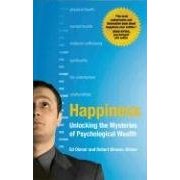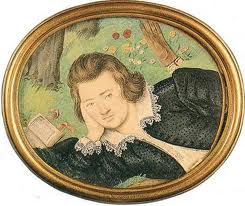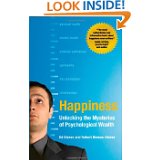- “I’d really be happy if I could just get that promotion.”
- “I can’t wait for my vacation!”
- “I wish I had just a little more money so I could make ends meet.”
- “I’d be glad if I could lose 10 pounds.”
- “I want those shoes!”
- “I should move to California.”
- “Thank God it’s Friday.”
When people think about what they want, it often has to do with improving their circumstances. People assume they’ll be happier if they could have a situation that includes things like the ones listed above.
I’m pretty sure Ed Diener ( “Dr. Happiness” ) has done more scientific research on happiness than anyone, and is considered by many the world’s foremost authority. Recently he wrote a book on the subject with his son, Robert Biswas-Diener ( “The Indiana Jones of Positive Psychology” ), who has also done some interesting research on happiness all over the world. If you want to be happier, it might make sense to listen to what they have to say.
The book is called Happiness: Unlocking the Mysteries of Psychological Wealth.
Part 1 (of 4 parts), “Understanding True Wealth,” includes Chapter 2: “Two Principles of Psychological Wealth.” The excerpts below are from their discussion of the first principle.
Caveat Emptor: Bad Stuff Happens … Even to Princesses
Take a moment and recall the classic story of Cinderella. Remember how she was cruelly mistreated by her stepsisters and their wicked mother? Do you recall how they made her slave away at the daily household chores? Remember how the dress she labored so hard over was torn to shreds in a fit of jealousy, and her hopes of going to the royal ball lay in tatters? Of course, you probably best remember the happy ending of the fairy tale: Cinderella’s magical godmother arrives in the nick of time, whisks her away to the dance, and engineers a quick infatuation, with the result that the beloved protagonist marries the charming prince. But is that the end of the story, or just the beginning?
It is interesting to consider what happened to Cinderella next, after she was betrothed and took up residence in Charming Castle. For people who believe that happiness is a matter of favorable circumstances, the story of Cinderella turns out to be a slam dunk. With a Hollywood-handsome husband, a royal title, all the riches she could want, and soldiers to guard her from the paparazzi, how could our belle of the ball not be happy? But for folks who are inclined to think of happiness as a process, the matter of Cinderella’s emotional fate is far from clear. Did Cinderella’s husband treat her well, or was he a philanderer in later life? Did she find some meaningful pastime to keep her occupied on the palace grounds? Were her children spoiled brats? Did she harbor resentment about her upbringing, or try to get revenge on her stepsisters? Did she grow bored with royal balls and court intrigue, or did she organize a dance program for the poor kids in her kingdom? Happiness, as we have said, is a process, not a destination. Just as Cinderella’s life did not end with her royal wedding, your emotional bliss is not complete once you have obtained some important goal. Life goes on, and even those great circumstances you achieve will not ensure you lasting happiness. For one thing, bad things can happen even to beautiful young princesses. But even if Cinderella’s life encountered few bumps on the fairyland road, she might have grown bored with the wonderful circumstances surrounding her, and needed new aims and activities to add zest to her life.
In the end, Cinderella’s quality of life was probably dictated less by her favorable circumstances and more by how she construed them. Hardships are an inevitable part of life, and having psychological wealth does not mean there are never any risks or losses. Of course there are. Happiness is not the complete absence of tough times, because that would be unrealistic. But, as we shall see later in this chapter and later in this book, negative emotions have a place in psychological wealth, and subjective interpretation plays an important role in happiness.
-Diener and Biswas-Diener, Happiness, pp. 16-17
(Chapter 2: Two Principles of Psychological Wealth)
Cinderella seemed to end up with a lot of the things we want (and don’t we spend a lot of time trying to get them?): money, prestige, a good-looking romantic partner, security. She was “successful”; she had “arrived.” But research on happiness is showing that good circumstances (even those of storybook quality) don’t necessarily have a lot to do with how happy people are. Of course, goals are important, but happiness is more about the process than it is about where you end up.
The next section in the book, a kind of thought experiment, illustrates this nicely.
Needing the Rigors of the Game
We sometimes ask our students whether they would accept the following pact with a genie. After floating out of his lamp, he offers to give you everything you desire, and as soon as the wish comes into your head, without the typical three-wish limit. The smirking genie says that anything you want will instantly come to you. You can’t wish for happiness, and you can’t wish that you will need to work for things to obtain them: no trickery of this type is allowed. Just solid old-school wishing for gold, castles, travel, beauty, friends, sports talent, intelligence, musical talent, good-looking dates, fast cars, and the like is permitted. Of course, most students wave their hands wildly, signaling that of course they would accept this great offer. Undoubtedly they are thinking of school loans, good grades, summers in Paris, and body fat. But – typically – as the class discussion proceeds, doubts begin to creep in. Maybe this all-wishes-granted deal, having everything and working for nothing, would become boring. Maybe you would adapt to all your blessings and they would no longer produce happiness. The discussion proceeds a bit further, and a few students begin to think the infinite-wishes deal might be hell on earth. Things would become boring, they reason, and life would lose its zest.
Students’ qualms about receiving everything without effort express our intuitive understanding that working for things we desire can be part of the pleasure of obtaining them. Just as climbing the mountain may be the major part of the fun, and simply being boosted to the top by a genie would be much less rewarding, much in life might be more meaningful and rewarding because of the efforts needed to obtain it. Not only will the eventual reward be more exciting, but the activities needed to gain the reward can themselves be very rewarding. The former justice of the United States Supreme Court Benjamin Cardozo expressed this well: “In the end the great truth will have been learned: that the quest is greater than what is sought, the effort finer than the prize (or, rather, that the effort is the prize), the victory cheap and hollow were it not for the rigor of the game.” The renowned justice went beyond saying that the goal-seeking activities enhance the final reward; he claimed that these activities are in fact the prize itself!
-Diener and Biswas-Diener, Happiness, pp. 17-18
(Chapter 2: Two Principles of Psychological Wealth)
You’ve probably heard the saying “Life’s a journey, not a destination.” The quotation is from Ralph Waldo Emerson, but it was also popularized by Aerosmith. If you do a Google search for “journey, not a destination” you’ll get a lot of interesting variations – other things that are “…a journey, not a destination”:

- Success
- Excellence
- Fitness
- Leadership
- Sustainability
- SEO (Search Engine Optimization)
- CRM (Customer Relationship Management)
- Windows Vista Security
But the most popular variation that comes up in the first few pages of Google is:
“Happiness is a journey, not a destination.”
This is also the essence of the first principle of Psychological Wealth.
 In the Matrix movies we learn that there was a previous matrix: a total virtual world provided for the humans, a utopia in which everyone was happy. But the program was a failure. Too many of the humans rejected it and “woke up” because that world was too perfect. Apparently they knew subconsciously that in real life people weren’t supposed to be that happy.
In the Matrix movies we learn that there was a previous matrix: a total virtual world provided for the humans, a utopia in which everyone was happy. But the program was a failure. Too many of the humans rejected it and “woke up” because that world was too perfect. Apparently they knew subconsciously that in real life people weren’t supposed to be that happy. Especially in centuries past, many people have thought that happiness is just a trivial luxury that has no substantial benefits, is not worthy of pursuit, perhaps
Especially in centuries past, many people have thought that happiness is just a trivial luxury that has no substantial benefits, is not worthy of pursuit, perhaps  even somewhat characteristic of imbecilic airheadedness. Intellectuals were above such nonsense; melancholy was to be expected. Author of the classic Madame Bovary, Gustave Flaubert famously declared: “To be stupid, selfish, and have good health are three requirements for happiness, though if stupidity is lacking, all is lost.”
even somewhat characteristic of imbecilic airheadedness. Intellectuals were above such nonsense; melancholy was to be expected. Author of the classic Madame Bovary, Gustave Flaubert famously declared: “To be stupid, selfish, and have good health are three requirements for happiness, though if stupidity is lacking, all is lost.” In their popular book, Happiness: Unlocking the Mysteries of Psychological Wealth, Diener and Diener tell us that “happiness, as it turns out, not only feels good, but is often good for you and for society.” They include the cynical quotations above, and specifically state that “Flaubert was dead wrong.”
In their popular book, Happiness: Unlocking the Mysteries of Psychological Wealth, Diener and Diener tell us that “happiness, as it turns out, not only feels good, but is often good for you and for society.” They include the cynical quotations above, and specifically state that “Flaubert was dead wrong.”![[Circle]](http://www.meaningandhappiness.com/pictures/GoldCircle36i.png)


 Getting back to Dunn and colleagues, who published their findings in March this year in
Getting back to Dunn and colleagues, who published their findings in March this year in 
